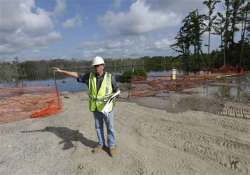Gas well in the Gulf continues to burn
New Orleans, Jul 24: An out-of-control natural gas well off the Louisiana coast continued to burn on Wednesday after it caught fire following a blowout that prompted the evacuation of 44 workers, authorities said.Meanwhile, officials

New Orleans, Jul 24: An out-of-control natural gas well off the Louisiana coast continued to burn on Wednesday after it caught fire following a blowout that prompted the evacuation of 44 workers, authorities said.
Meanwhile, officials stressed that Tuesday's blowout wouldn't be close to as damaging as the 2010 BP oil spill, in which an oil rig, the Deepwater Horizon, exploded off the Louisiana coast, killing 11 workers and eventually spewing millions of gallons of oil into the Gulf of Mexico.
No injuries were reported as a result of Tuesday night's fire, Eileen Angelico, a spokeswoman for the Bureau of Safety and Environmental Enforcement, told The Associated Press.
She said it wasn't known what caused the gas to ignite. It also wasn't clear early Wednesday how and when crews would attempt to extinguish the blaze.
BSEE said earlier on Tuesday that a firefighting vessel with water and foam capabilities had been dispatched to the scene.
Wild Well Control Inc. was hired to try to bring the well under control. Angelico said Wild Well personnel approached the well earlier Tuesday night, before the fire, but they determined it was unsafe to get closer when they were about 200 feet (60 meters) away from it.
The gas blowout was reported on Tuesday morning.
The Coast Guard kept nautical traffic out of an area within 500 meters (500 yards) of the site throughout the day. The Federal Aviation Administration restricted aircraft up to 2,000 feet (600 meters) above the area.
BSEE said inspectors flying over the site soon after the blowout saw a light sheen covering an area about a half-mile by 50 feet (15 meters). However, it was dissipating quickly.
Earlier this month, a gas well off the Louisiana coast flowed for several days before being sealed.
Chris Roberts, a member of the Jefferson Parish Council in south Louisiana, said the travel restrictions might pose an inconvenience for participants in an upcoming deep sea fishing tournament.
“It could change some plans as to where some people plan to fish,” he said.
Tuesday's blowout occurred near an unmanned offshore gas platform that was not currently producing natural gas, said Angelico.
The workers were aboard a portable drilling rig known as a jackup rig, owned by Hercules Offshore Inc., which was a contractor for exploration and production company Walter Oil & Gas Corp.
Walter Oil & Gas reported to the BSEE that the rig was completing a “sidetrack well”—a means of re-entering the original well bore, Angelico said.
The purpose of the sidetrack well in this instance was not immediately clear. A spokesman for the corporation did not have the information Tuesday night.
Industry websites say sidetrack wells are sometimes drilled to remedy a problem with the existing well bore.
“It's a way to overcome an engineering problem with the original well,” Ken Medlock, an energy expert at Rice University's Baker Institute said. “They're not drilled all the time, but it's not new.”
Meanwhile, officials stressed that Tuesday's blowout wouldn't be close to as damaging as the 2010 BP oil spill, in which an oil rig, the Deepwater Horizon, exploded off the Louisiana coast, killing 11 workers and eventually spewing millions of gallons of oil into the Gulf of Mexico.
No injuries were reported as a result of Tuesday night's fire, Eileen Angelico, a spokeswoman for the Bureau of Safety and Environmental Enforcement, told The Associated Press.
She said it wasn't known what caused the gas to ignite. It also wasn't clear early Wednesday how and when crews would attempt to extinguish the blaze.
BSEE said earlier on Tuesday that a firefighting vessel with water and foam capabilities had been dispatched to the scene.
Wild Well Control Inc. was hired to try to bring the well under control. Angelico said Wild Well personnel approached the well earlier Tuesday night, before the fire, but they determined it was unsafe to get closer when they were about 200 feet (60 meters) away from it.
The gas blowout was reported on Tuesday morning.
The Coast Guard kept nautical traffic out of an area within 500 meters (500 yards) of the site throughout the day. The Federal Aviation Administration restricted aircraft up to 2,000 feet (600 meters) above the area.
BSEE said inspectors flying over the site soon after the blowout saw a light sheen covering an area about a half-mile by 50 feet (15 meters). However, it was dissipating quickly.
Earlier this month, a gas well off the Louisiana coast flowed for several days before being sealed.
Chris Roberts, a member of the Jefferson Parish Council in south Louisiana, said the travel restrictions might pose an inconvenience for participants in an upcoming deep sea fishing tournament.
“It could change some plans as to where some people plan to fish,” he said.
Tuesday's blowout occurred near an unmanned offshore gas platform that was not currently producing natural gas, said Angelico.
The workers were aboard a portable drilling rig known as a jackup rig, owned by Hercules Offshore Inc., which was a contractor for exploration and production company Walter Oil & Gas Corp.
Walter Oil & Gas reported to the BSEE that the rig was completing a “sidetrack well”—a means of re-entering the original well bore, Angelico said.
The purpose of the sidetrack well in this instance was not immediately clear. A spokesman for the corporation did not have the information Tuesday night.
Industry websites say sidetrack wells are sometimes drilled to remedy a problem with the existing well bore.
“It's a way to overcome an engineering problem with the original well,” Ken Medlock, an energy expert at Rice University's Baker Institute said. “They're not drilled all the time, but it's not new.”